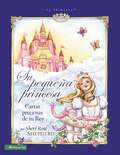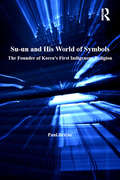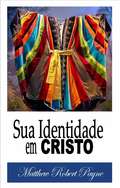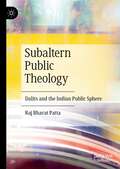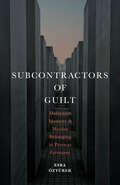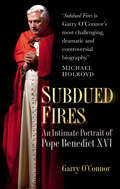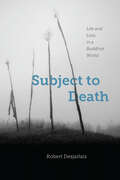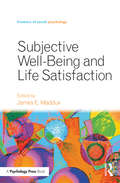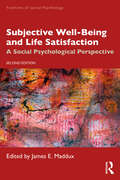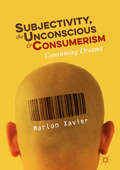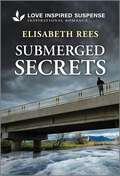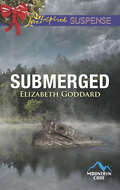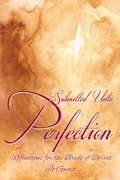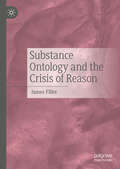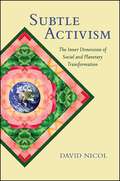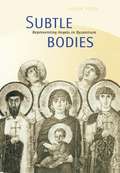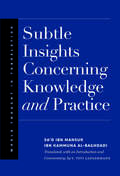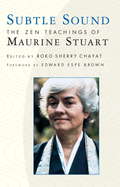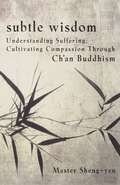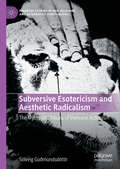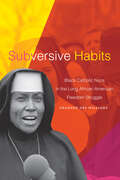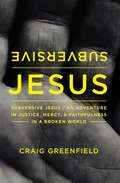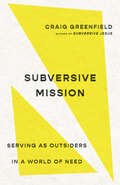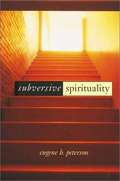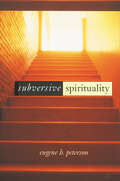- Table View
- List View
Su pequeña princesa: Cartas preciosas de tu rey (Su Princesa Serie)
by Sheri Rose ShepherdUn maravilloso obsequio para esa princesa especial que hay en tu vida: cartas personales de su Rey. ¡Cada día ella encontrará inspiración en una carta para vivir como la princesa radiante que es! ¡Ahora, las niñas entre cuatro y nueve años pueden descubrir que en verdad están llamadas a ser parte de una familia real! Comprenderán lo mucho que las ama y adora Dios, el Rey de reyes.
Su-un and His World of Symbols: The Founder of Korea's First Indigenous Religion
by Paul BeirneSu-un and His World of Symbols explores the image which Choe Che-u (Su-un), the founder of Donghak (Eastern Learning) Korea's first indigenous religion, had of himself as a religious leader and human being. Su-un gave his life so that he could share his symbols, his scriptures and the foundational principals of his religion with all people, regardless of their status, gender, age or education. His egalitarian creed challenged the major religious traditions in Korea, and Korean society as a whole, to reflect on the innate dignity of each individual, and to reform their social, ethical and religious practices to accord with the reality of the Divine presence in the 'sacred refuge' that lies within. Exploring the two symbols which Su-un created and used to disseminate his religion, and the two books of Scripture which he composed, this book breaks new ground by presenting the only major work in English which attempts to ascertain the image Su-un had of himself as the prototype of a new kind of religious leader in Korea, and by extension, East Asia.
Sua Identidade em Cristo
by Matthew Robert PayneQuando o Pai enviou Jesus para salvar o mundo, não foi apenas em razão dos pecados cometidos pela humanidade, mas também a fim de preparar a todos para viver em seu mundo e assumir o lugar que lhes é de direito no Reino do Pai. Ele nos resgatou do domínio das trevas e nos transportou para o reino do seu Filho amado, em quem temos a plena redenção por meio do seu sangue, isto é, o perdão de todos os pecados. A fé é incrível, mas nem todos entendem seu verdadeiro significado na vida. Neste livro, Matthew Robert Payne compartilha suas experiências e desafios na tentativa de encontrar a si mesmo e seu lugar no mundo cristão, além de apresentar ideias notáveis que farão você avaliar seu atual entendimento de versículos familiares aos cristãos. O livro esclarece ao ouvinte o verdadeiro significado de pertencer à família de Cristo e do perdão em sua totalidade. Aborda também o segredo por trás de uma vida sem pecado e o verdadeiro relacionamento com Deus. Junte-se a Matthew para descobrir a surpreendente verdade da graça de Deus. Seria mesmo possível não pecar? Escute o audiolivro e encontre a resposta. Deixe-se contagiar pela alegria de Matthew mediante todas as portas e possibilidades que se abrem quando entendemos que cada um de nós pertence à geração eleita, real, santa e especial aos olhos de Deus. Ao abordar sua vida diária, Sua Identidade em Cristo terá uma influência maravilhosa, ajudando você a se libertar de qualquer sentimento de culpa ou vergonha que esteja nutrindo como cristão. Os capítulos são breves e simples, e é fácil se identificar com as ideias do autor. Prepare-se para 19 capítulos com uma incrível e surpreendente interpretação da jornada de um seguidor de Cristo.
Subaltern Public Theology: Dalits and the Indian Public Sphere
by Raj Bharat PattaThis book delves into the public character of public theology from the sites of subalternity, the excluded Dalit (non) public in the Indian public sphere. Raj Bharat Patta employs a decolonial methodology and explores the topic in three parts: First, he engages with ‘theological contexts,’ by mapping global and Indian public theologies and critically analysing them. Next, he discusses ‘theological companions,’ and explains ‘theological subalternity’ and ‘subaltern public’ as companions for a subaltern public theology for India. Finally, Patta explains ‘theological contours’ by discussing subaltern liturgy as a theological account of the subaltern public and explores a subaltern public theology for India.
Subcontractors of Guilt: Holocaust Memory and Muslim Belonging in Postwar Germany
by Esra ÖzyürekAt the turn of the millennium, Middle Eastern and Muslim Germans had rather unexpectedly become central to the country's Holocaust memory culture—not as welcome participants, but as targets for re-education and reform. Since then, Turkish- and Arab-Germans have been considered as the prime obstacles to German national reconciliation with its Nazi past, a status shared to a lesser degree by Germans from the formerly socialist East Germany. It is for this reason that the German government, German NGOs, and Muslim minority groups have begun to design Holocaust education and anti-Semitism prevention programs specifically tailored for Muslim immigrants and refugees, so that they, too, can learn the lessons of the Holocaust and embrace Germany's most important postwar democratic political values. Based on ethnographic research conducted over a decade, Subcontractors of Guilt explores when, how, and why Muslim Germans have moved to the center of Holocaust memory discussions. Esra Özyürek argues that German society "subcontracts" guilt of the Holocaust to new minority immigrant arrivals, with the false promise of this process leading to inclusion into the German social contract and equality with other members of postwar German society. By focusing on the recently formed but already sizable sector of Muslim-only anti-Semitism and Holocaust education programs, this book explores the paradoxes of postwar German national identity.
Subdued Fires: An Intimate Portrait of Pope Benedict XVI
by Garry O'ConnorOmaha Beach, June 6, 2004. A delegation sent by John Paul II from the Vatican to commemorate the 60th anniversary of D-Day is headed by Joseph Ratzinger, a former Nazi youth who, while resident in Rome for the previous 23 years, is known as ‘The Panzer Cardinal’. Ratzinger insisted on being at the commemoration. Garry O’Connor’s biography begins here. And what is revealed from that point is an extraordinary figure, a man who a year later would be Pope, something no one predicted, at the age of 78. How did 12 years of Nazi rule affect the young Ratzinger? Did it inform his stand on religious persecution; famine and poverty; war and its consequences; climate change; stem-cell research and biological engineering; marriage and the family; abuse by priests; abortion, contraception, women priests, homosexuality, declining ordinations and Church attendance in Western Europe? And is it relevant to his astonishing resignation in February 2013? There is no one better qualified than Gary O’Connor, author of the international best seller, Universal Father: a Life of Pope John Paul II, to tell this remarkable story.
Subject to Death: Life and Loss in a Buddhist World
by Robert DesjarlaisIf any anthropologist living today can illuminate our dim understanding of death's enigma, it is Robert Desjarlais. With Subject to Death, Desjarlais provides an intimate, philosophical account of death and mourning practices among Hyolmo Buddhists, an ethnically Tibetan Buddhist people from Nepal. He studies the death preparations of the Hyolmo, their specific rituals of grieving, and the practices they use to heal the psychological trauma of loss. Desjarlais's research marks a major advance in the ethnographic study of death, dying, and grief, one with broad implications. Ethnologically nuanced, beautifully written, and twenty-five years in the making, Subject to Death is an insightful study of how fundamental aspects of human existence--identity, memory, agency, longing, bodiliness--are enacted and eventually dissolved through social and communicative practices.
Subjective Well-Being and Life Satisfaction (Frontiers of Social Psychology)
by James E. MadduxThe quality of people’s relationships with and interactions with other people are major influences on their feelings of well-being and their evaluations of life satisfaction. The goal of this volume is to offer scholarly summaries of theory and research on topics at the frontier of the study of these social psychological influences—both interpersonal and intrapersonal—on subjective well-being and life satisfaction. The chapters cover a variety of types of relationships (e.g., romantic relationships, friendships, online relationships) as well as a variety of types of interactions with others (e.g., forgiveness, gratitude, helping behavior, self-presentation). Also included are chapters on broader social issues such as materialism, sexual identity and orientation, aging, spirituality, and meaning in life. Subjective Well-Being and Life Satisfaction provides a rich and focused resource for graduate students, upper-level undergraduate students, and researchers in positive psychology and social psychology, as well as social neuroscientists, mental health researchers, clinical and counselling psychologists, and anyone interested in the science of well-being.
Subjective Well-Being and Life Satisfaction: A Social Psychological Perspective (ISSN)
by James E. MadduxThis comprehensive and updated new edition offers scholarly summaries of theory and research on the social psychological influences on subjective well-being and life satisfaction.Among the topics covered are types of relationships (e.g., romantic relationships, friendships, online relationships) and types of interactions with others (e.g., forgiveness, gratitude, helping behavior). It also examines broader social issues such as culture, socioeconomic status, religion, and well-being in the workplace. The latest edition includes new chapters on economic inequality, psychedelic social psychology, singlehood, social worth, and identity.Subjective Well-Being and Life Satisfaction: A Social Psychological Perspective is a rich and focused resource for graduate students, upper-level undergraduate students, and researchers in positive psychology and social psychology. It should also be of interest to social neuroscientists, mental health researchers, clinical and counselling psychologists, and anyone interested in the science of well-being.
Subjectivity, the Unconscious and Consumerism: Consuming Dreams
by Marlon XavierSubjectivity, the Unconscious and Consumerism is a unique and imaginative psycho-sociological exploration of how postmodern, contemporary consumerism invades and colonises human subjectivity. Investigating especially consumerism’s unconscious aspects such as desires, imagination, and fantasy, it engages with an extensive analysis of dreams. The author frames these using a synthesis of Jungian psychology and the social imaginaries of Baudrillard and Bauman, in a dialogue with the theories of McDonaldization and Disneyization. The aim is to broaden our understanding of consumerism to include the perennial consumption of symbols and signs of identity - a process which is the basis for the fabrication of the commodified self. The book offers a profound, innovative critique of our consumption societies, challenging readers to rethink how we live, and how our identities are impacted by consumerism. As such it will be of interest to students and scholars of critical psychology, psychoanalysis, sociology, anthropology and cultural studies, but is also accessible to anyone interested in the complex psychology of contemporary subjectivity.
Submerged Secrets
by Elisabeth ReesBeneath the water lies a truth someone is desperate to hide. When a raging flood inundates her small town, Olivia Moretti is horrified to discover the bones of a murdered woman in the waterlogged basement of her family&’s café. Even more shocking, her late grandfather becomes the sole suspect. Determined to prove his innocence, Olivia starts asking questions and soon draws the attention of an unknown enemy who wants to silence her. Fire chief and business rival Cal Mackenzie comes to her rescue and steps in as her protector. But as the floodwaters continue to rise, and with a killer on their tail, they&’ll have to discover the truth…before Olivia becomes the next victim.From Love Inspired Suspense: Courage. Danger. Faith.
Submerged: Perfect Alibi Submerged Christmas In Hiding (Mountain Cove #4)
by Elizabeth GoddardSearching for her missing father in Alaska takes a woman on a dangerous adventure in this inspirational romantic suspense novel by a USA Today bestseller.With Christmas just around the corner, Cobie MacBride wants closure in the case of her missing father. But when a visit to the last place he was seen leads to an attack by a masked assailant, Cobie knows she’s in over her head. Running for her life, she never expected to find safety with Adam Warren—the man she blames for her brother’s death. Seeking answers leads them to a treasure ship, buried secrets . . . and deadly danger. Christmas could find them starting a new future—if they can avoid getting trapped in the perils of the past.Experience more action-packed mystery and suspense in the rest of the Mountain Cove series by Elizabeth Goddard.
Submitted Unto Perfection: Reflections for the Bride of Christ
by Jo GwostSubmitted Unto Perfection is a collection of writings penned over a number of years. The title was given to me by the Lord over thirty years ago. Before writing it I had to live it. This short book reflects some of my life lived submitted unto Him. I hope it stirs the hearts of those who love God, to draw to Him, in fuller trust and devotion.
Substance Ontology and the Crisis of Reason
by James FillerIn this book, James Filler traces the history of Being, understood as substance, from Parmenides through the Scholastics and ending with Descartes, in whom this understanding reaches a crisis. He further shows how this understanding inherently leads to serious ontological problems which are unresolvable within a substance ontological approach. It is this substance understanding which has dominated, but this view--with its emphasis on distinctness, independence, and separateness--will create insurmountable problems which ultimately lead to a crisis of thought after Descartes. The book examines this substance understanding, how it has historically shaped the understanding of Being, and how this understanding ultimately becomes ontologically and epistemologically destructive.
Subtle Activism: The Inner Dimension of Social and Planetary Transformation (SUNY series in Transpersonal and Humanistic Psychology)
by David NicolCan awakened consciousness contribute to social change and, if so, how? David Nicol introduces the concept of "subtle activism" to describe the use of consciousness-based practices like meditation and prayer to support collective transformation, such as global meditation directed toward peaceful resolution of a conflict. Subtle activism represents a bridge between the consciousness movement and the movements for peace, environmental sustainability, and social justice. It is not a substitute for physical action but rather a potentially crucial component of a more integrated approach to social change. Although ancient lore is rife with tales of shamans and adepts intervening on spiritual levels for the benefit of humanity, this book is the first comprehensive treatment of this topic. Nicol grounds his consideration in the available scientific research and in dialogue with a broad range of thinkers in the fields of consciousness studies, transpersonal theory, and New Paradigm thought.
Subtle Bodies: Representing Angels in Byzantium
by Glenn PeersHow Byzantine artists approached the problem of representing the incorporeal, immaterial forms and inscrutable natures of angels.
Subtle Insights Concerning Knowledge and Practice (World Thought in Translation)
by Sa‘d Ibn Kammuna al-BaghdadiSurprisingly modern essays on the unity of all monotheistic regimens by a medieval philosopher Written in the mid‑thirteenth century for the newly appointed governor of Isfahan, this compact treatise and philosophical guidebook includes a wide‑ranging and accessible set of essays on ethics, psychology, political philosophy, and the unity of God. Ibn Kammūna,a Jewish scholar writing in Baghdad during a time of Mongol occupation, was a controversial figure whose writings sometimes incited riots. He argued, among other things, the commonality of all monotheisms, both prophetic and philosophical. Here, for the first time in English, is a surprisingly modern work on the unity of all monotheistic regimes from a key medieval philosopher.
Subtle Sound: The Zen Teachings of Maurine Stuart
by Sherry ChayatMaurine Stuart (1922-1990) was one of a select group of students on the leading edge of Buddhism in America: a woman who became a Zen master. In this book, she draws on down-to-earth Zen stories, her friendships with Japanese Zen teachers, and her experiences as a concert pianist to apply the inner meanings of Buddhism to practicing the basic ethics of daily living--nowness, unselfishness, compassion, and good will toward every living being. She emphasizes that inner growth comes through our own efforts and intuition, especially as we cultivate them through meditation practice. We can then take what we have learned in meditation and use it to respond to our daily lives in a straightforward and creative way, guided not by concepts or dogma, but by direct insight into the reality of the present moment.
Subtle Wisdom: Understanding Suffering, Cultivating Compassion Through Ch'an Buddhism
by Master Sheng YenMaster Sheng-yen, a dharma descendant from the founders of Buddhism in China, considers the concepts of suffering, enlightenment, and compassion; provides a glossary of key terms; and briefly recaps the history of Buddhism in China. But he goes beyond these issues to discuss contemporary matters and questions he has encountered in his years of teaching in the United States. Sometimes personal and always instructive, Sheng-yen's introductory work is perfect for those just coming to Buddhism, and for those who are already very familiar with the Tibetan and Zen schools.
Subversive Esotericism and Aesthetic Radicalism: The Myths and Rituals of Viennese Actionism (Palgrave Studies in New Religions and Alternative Spiritualities)
by Sólveig GuðmundsdóttirIn this book, Sólveig Guðmundsdóttir uncovers the crucial role of esotericism in the art of the Vienna Actionists—a group of Austrian neo-avant-garde artists, infamous for their transgressive performance art. Addressing this frequently overlooked aspect of Actionism, Guðmundsdóttir traces, historicizes, and examines the esoteric discourses in selected works: the collective manifesto Die Blutorgel (1962), Rudolf Schwarzkogler’s text Das Ästhetische Panorama (1967/68) and the performances Abreaktionsspiel (1970) by Hermann Nitsch, and Zerreißprobe (1970) by Günter Brus. Mapping out the various discursive entanglements as they appear in the works, i.e. between esotericism and psychoanalysis, fascism, gender, sexuality, aesthetics, science, orientalism and religious discourses, the author illustrates and establishes the importance of esoteric traditions for the Actionists’ art and subversive practices. The historical analysis of the artworks reflects on the cultural nexus of post-war Austria, as well as the relations between radical politics, countercultures and esotericism, and how they appear in Actionism. Guðmundsdóttir argues that to survey the historical placement of esotericism is vital for understanding not only the context of their works, but also the contradictory image of the Actionists as both anti-authoritarian and reactionary artists.
Subversive Habits: Black Catholic Nuns in the Long African American Freedom Struggle
by Shannen Dee WilliamsIn Subversive Habits, Shannen Dee Williams provides the first full history of Black Catholic nuns in the United States, hailing them as the forgotten prophets of Catholicism and democracy. Drawing on oral histories and previously sealed Church records, Williams demonstrates how master narratives of women’s religious life and Catholic commitments to racial and gender justice fundamentally change when the lives and experiences of African American nuns are taken seriously. For Black Catholic women and girls, embracing the celibate religious state constituted a radical act of resistance to white supremacy and the sexual terrorism built into chattel slavery and segregation. Williams shows how Black sisters—such as Sister Mary Antona Ebo, who was the only Black member of the inaugural delegation of Catholic sisters to travel to Selma, Alabama, and join the Black voting rights marches of 1965—were pioneering religious leaders, educators, healthcare professionals, desegregation foot soldiers, Black Power activists, and womanist theologians. In the process, Williams calls attention to Catholic women’s religious life as a stronghold of white supremacy and racial segregation—and thus an important battleground in the long African American freedom struggle.
Subversive Jesus: An Adventure in Justice, Mercy, and Faithfulness in a Broken World
by Craig Warren GreenfieldWhen Jesus left the most exclusive gated community in the universe to come live with the people he loved and gave his life for, he turned everything we know and believe about life on its head. Jesus said that he came to bring good news to the poor, but most Western Christians remain disconnected and isolated from the poor and their contexts of injustice. Even our churches echo society’s pressure to isolate ourselves from the margins (e.g. by moving to a better suburb) and instead teach us how to be “nice people” who worship a “nice Jesus” and don’t disrupt the status quo. Convinced that Jesus places love for the poor and the pursuit of justice central, Craig Greenfield has sought to follow in Christ’s footsteps by living among people at the edges of society for the last fourteen years. His quest to follow this Subversive Jesus has taken Craig and his young family from the slums of Asia to inner city Canada and back again. This is the story of how Jesus led them to the margins: initiating the Pirates of Justice flash mobs, sharing their home with detoxing crackheads, welcoming homeless panhandlers and prostitutes to the dinner table, and ultimately sparking a movement to reach the world’s most vulnerable children. This book is a strong and potentially controversial critique of the status quo too often found in our churches, but it offers an inspirational and hopeful vision of another way. While readers may not relocate to a slum, they will certainly come to view their lives and ministry through a fresh lens—reconsidering how they are uniquely called by Jesus to subversively love the poor and break down systems of injustice in their sphere of influence.
Subversive Mission: Serving as Outsiders in a World of Need
by Craig GreenfieldFor many, missions is the story of heroes, martyrs, and the advance of the gospel. For others, it's the story of colonialism and missionary disasters. So how do we respond to God's call to love our neighbors as a new era emerges?Subversive mission is submission—to God and local leaders. Subversive mission offers a new way forward for outsiders called to crosscultural ministry by serving as humble alongsiders. Join Craig Greenfield on this inspiring journey in Asia and beyond as he rediscovers the fivefold missional gifts of apostle, prophet, evangelist, pastor, and teacher, and demonstrates how each of these must look radically different in a crosscultural context. Along the way, you'll discover your own missional type through the Missional Type Inventory and come face to face with the five most common pitfalls that Westerners face in crosscultural settings.already
Subversive Spirituality
by Eugene H. PetersonIn Subversive Spirituality Peterson has gathered together a host of writings penned over the past twenty-five years that reflect on the overlooked facets of the spiritual life. Comprising occasional pieces, short biblical studies, poetry, pastoral readings, and interviews, this work captures the epiphanies of life with the pleasing pastoral style and inspiring depth of insight for which Peterson is well known. Peterson describes his book this way: "This gathering of articles and essays, poems and conversations, is a kind of kitchen midden of my noticings of the obvious in the course of living out the Christian life in the vocational context of pastor, writer, and professor. The randomness and repetitions and false starts are rough edges that I am leaving as is in the interests of honesty. Spirituality is not, by and large, smooth. I do hope, however, that these pieces will be found to be freshly phrased."
Subversive Spirituality
by Eugene H. PetersonSubversive Spirituality is a gathering together of articles written by Eugene Peterson over the past twenty-five years. Made up of occasional pieces, short biblical studies, poetry, pastoral readings and interviews, this book reflects on the overlooked facets of the spiritual life. Peterson captures the epiphanies of life with the pleasing pastoral style and inspiring depth of insight for which he is well known.Peterson describes his book this way: "The gathering of articles and essays, poems and conversations, is a kind of kitchen midden of my noticings of the obvious in the course of living out the Christian life in the vocational context of pastor, writer, and professor. The randomness and repetitions and false starts are rough edges that I am leaving as is in the interests of honesty. Spirituality is not, by and large, smooth. I do hope, however, that they will be found to be 'freshly phrased.'"
